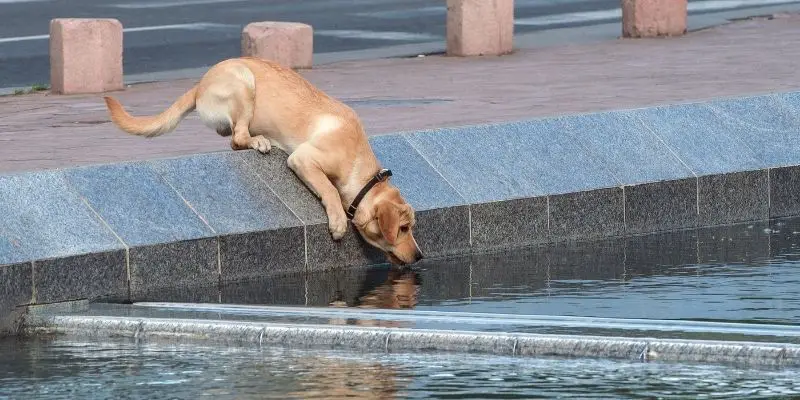Suppose you’ve never heard of water intoxication in dogs. In that case, you’re about to learn about an important topic that will help keep your dog healthy.
Perhaps you’ve noticed your dog drinking a lot and are wondering what causes a dog to consume so much water and what the implications are. And, given that you’ve arrived at this page, you’re probably curious about whether or not drinking too much water can induce diarrhea in dogs.
Do you have a specific question about the drinking being a potential cause of diarrhea in dogs? Then use the table of contents below to jump to the most relevant section. And you can always go back by clicking on the black arrow in the right bottom corner of the page. Also, please note that some of the links in this article may be affiliate links. For more details, check the Disclosure section at the bottom of the page.
Here's what we'll cover:
Can a dog drink too much water?
Canine Dehydration Dogs, believe it or not, can overhydrate as well. Sometimes known as “water intoxication,” overhydration is just as deadly as dehydration. It can be caused by excessive drinking and water that the dog unwittingly consumes while swimming or playing in the water.
What is an excessive amount of water?
Average water intake ranges from 0.5 to 1 ounce per pound of body weight per day (40-70ml/kg/day). Excessive water intake is defined as consuming more than 2oz/lbs/day (>100ml/kg/day).
What is the most common cause of dog diarrhea?
There are so many probable causes of diarrhea in dogs that determining the most common can be challenging!
While doggie diarrhea is difficult to prevent and a nightmare to deal with (particularly at night), identifying the specific cause will assist in decreasing the frequency and duration of each terrible episode.
The following are some of the most common causes of diarrhea in dogs: eating bad food, ingesting foreign objects, parasites, dietary changes, stress, allergy, liver, and renal illness, pharmaceutical side effects, etc. Diarrhea is not the most frequent ailment.
Can too much water cause diarrhea in dogs?
Overhydration symptoms might mimic those of dehydration. When there is an overabundance of water in the body, the kidneys cannot remove it. It begins to accumulate in the body, causing vomiting and diarrhea. So, yes, drinking too much water can cause diarrhea in dogs in rare situations. Although it is obvious that diarrhea frequently leads to dehydration, it is still important to ensure that the dog drinks plenty of water, even if it is still experiencing messy stool.
How do you know if your dog drank too much water?
It is typically pretty obvious when your dog has consumed too much water and is suffering from water intoxication! This is due to the canine experiencing unusual symptoms after eating such a large amount of water.
If your dog consumes a lot of water on purpose, they may develop hyponatremia. However, it is more typical when a dog plays with water, such as at the beach or pool.
While it appears to be a lot of fun, it’s better to avoid games where your dog must recover a toy or ball from the water. These games dramatically enhance the likelihood of your poor pooch drinking too much water.
Water intoxication in dogs can cause the following signs and symptoms:
- Vomiting
- Confusion
- Lethargy
- Disorientation
- Breathing difficulties
- Excessive drooling
- Seizures
- Coma
The good news is that dogs suffering from water intoxication frequently recover completely. However, this is dependent on the owner’s swift action and the speed with which the dog is treated by a skilled veterinarian.
Thanks for the blog graphics: Canva.com

Thanks for the blog graphics: Canva.com
Doghint.com is a participant of several affiliate programs. The list includes (but not limited to) the following: VigLink, Refersion, ShareASale, and Amazon Services LLC Associates Program, an affiliate advertising program designed to provide a mean for us to earn fees by linking to Amazon.com and affiliated sites. Doghint.com does not intend to provide veterinary advice. All published articles are meant for informational purposes only and not substitute the professional veterinary consultation.


